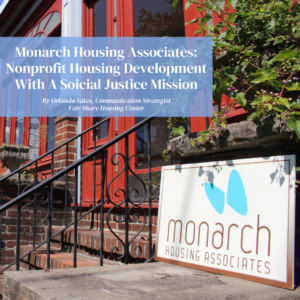A History of the Mount Laurel Doctrine
October 28th, 2022
By Martina Manicastri
In 1975, Black and Latino community organizers in South Jersey won a landmark civil rights case against Mount Laurel Township that to this day, still constitutes one of the most progressive housing laws in the nation. As the rise of suburbia prompted a national trend of white flight and gentrification, white people left the cities of Camden and Philadelphia in favor of more suburban towns, like Mount Laurel Township. In Mount Laurel, residents of the Township’s historic Black neighborhood suddenly found themselves priced out of generational homes to make space for a new affluent white population, with no affordable housing alternatives. The Township even went so far as to demolish the homes of residents who could no longer afford to live there.
In response, local community members formed the Springville Community Action Committee (SCAC) with the goal of buying and building affordable housing. Ethel Lawrence, a schoolteacher and longtime Mount Laurel community leader, spearheaded efforts alongside others to try and obtain zoning approval for the construction of 36 affordable homes. To the community’s dismay, the zoning board denied the SCAC’s request and blocked their efforts to build affordable housing. Consequently, Mount Laurel’s then-mayor, Bill Haines, infamously told the Black community of Mount Laurel, “If you people can’t afford to live in our town, then you’ll just have to leave.” His remark is a testament to the kind of racial and economic discrimination that fueled both Jim Crow segregation and de facto segregation in the years to come.
Rather than back down, Mount Laurel’s local and expansive community came together to fight. Ethel Lawrence and other Black Mount Laurel residents joined forces with the Southern Burlington County NAACP, the Camden County NAACP, and other Black and Latino residents residing in Camden. Together, they filed class action litigation against the Township, naming Ethel Lawrence as the primary plaintiff. The case claimed that the town used zoning laws to systematically exclude people of color and the poor by eliminating access to affordable housing. In 1975, the New Jersey Supreme Court sided with Ethel Lawrence and the community she represented, officially declaring that all New Jersey municipalities are responsible for providing their “fair share” of affordable housing. This decision was a monumental win for inclusionary and affordable housing, but it was not left unchallenged by townships that wished to shirk their affordable housing responsibilities.
The Doctrine was first upheld in 1983 in the New Jersey Supreme Court decision known as Mount Laurel II, in which the Court offered slight revisions to the initial decision, and built in new ways to enforce the Doctrine. Shortly thereafter, in 1985, the NJ Legislature passed the Fair Housing Act which transitioned enforcement of the Doctrine away from the courts and instead to a state agency called the Council on Affordable Housing (COAH). For nearly two decades, COAH was responsible for the promulgation of rules, the review of fair housing plans, and the determination of each township’s fair share numbers. However, in 1999, as a result of political tensions and a clear desire to limit the construction of affordable housing, COAH became defunct. While it continued to exist, it failed to do its job.
In 2009, Governor Chris Christie attempted to abolish COAH, which would have effectively left no avenues for the enforcement of the Mount Laurel Doctrine, but his attempts repeatedly failed. Under Governor Christie’s leadership, COAH issued rules that explicitly violated the Mount Laurel Doctrine, and Fair Share Housing Center sued New Jersey for the violations. In 2015, just over 15 years since COAH became defunct, the NJ Supreme Court ruled in favor of Fair Share and transitioned the enforcement of the Mount Laurel Doctrine back to the trial court system in a decision known as Mount Laurel IV. In its decision, the Court also designated Fair Share Housing Center as the legal entity to represent the interests of the public, thereby requiring towns to work with Fair Share to meet their affordable housing requirements. In the last seven years, Fair Share Housing Center has settled over 340 cases with New Jersey towns to ensure they build their fair share of affordable housing, resulting in tens of thousands of new affordable homes for NJ residents and families.
The Mount Laurel Doctrine’s continued success is owed in large part to Fair Share Housing Center. Its founder, Peter J. O’Connor, was one of the three lawyers to represent Ethel Lawrence and the interests of Mount Laurel’s community in Mount Laurel I. Since its founding in 1975, the center has litigated on behalf of the Mount Laurel Doctrine’s maintenance and it has worked to expand the reach of Mount Laurel’s anti-discriminatory impact. Fair Share Housing Center has met every challenge to the Mount Laurel Doctrine with the same fighting spirit as Mount Laurel’s original community organizers, and it will continue to do so until housing justice is achieved for all.





